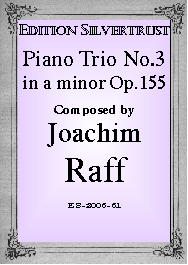Presents
Joachim Raff
Piano Trio No.3 in a minor, Op.155
 It seems
virtually unimaginable that a composer whose talent was recognized and whose
music was admired by Mendelssohn and Liszt, could become a mere footnote, yet
this is what became of Raff and his music for most of the 20th century. Only now
is he being rediscovered to the delight of those fortunate enough to hear his
music. From
1860 to 1900 the name of Joachim Raff
(1822-1882) was
regularly mentioned in the
same breath as Wagner, Liszt, and Brahms as one of Germany's leading composers.
All of the critical commentaries which appeared during those years spoke of him
as an equal to such masters as Mendelssohn, Schumann, Brahms, and Tchaikovsky.
Incredibly, by the 1920's his music had all but disappeared from the concert
stage.
It seems
virtually unimaginable that a composer whose talent was recognized and whose
music was admired by Mendelssohn and Liszt, could become a mere footnote, yet
this is what became of Raff and his music for most of the 20th century. Only now
is he being rediscovered to the delight of those fortunate enough to hear his
music. From
1860 to 1900 the name of Joachim Raff
(1822-1882) was
regularly mentioned in the
same breath as Wagner, Liszt, and Brahms as one of Germany's leading composers.
All of the critical commentaries which appeared during those years spoke of him
as an equal to such masters as Mendelssohn, Schumann, Brahms, and Tchaikovsky.
Incredibly, by the 1920's his music had all but disappeared from the concert
stage.
Raff was born near Zurich and his family had hoped he would be come a school teacher, but music was his first love. Basically self-taught, Raff sent some of his early compositions to Mendelssohn who immediately recognized his talent and arranged for their publication. Unfortunately, Mendelssohn died before he could help Raff much more. The young composer then approached Liszt who also took an interest in him and took him on as his personal secretary and copyist. During the six years he spent with Liszt, Raff became a member of the so-called "New German School" led by Wagner and Liszt. Although he broke from them in 1856, he was still regarded as a Wagnerite by the supporters of Brahms and the other classicists. In short, Raff was in neither camp, but attacked by both. Isolated, he went his own way, paying little attention to the musical politics of late 19th century Germany.
But going his own way was hardly an easy proposition. Nearly starving, for many years Raff was forced to crank out compositions for the commercial market (works that would sell but were of little intrinsic or artistic merit), one after another as fast as he could. Sadly, this was later to tarnish his legacy. After his reputation had faded, he was regarded merely as a composer of parlor pieces, despite the magnificent symphonic and chamber works he left behind. Anyone who has had the time to hear these great works quickly realizes that Raff could be an impeccable craftsman when he had the luxury of time and was not forced to write for the home music-making marketplace.
Piano Trio No.3 was published in 1872. The opening movement, marked Quasi a capriccio, Allegro agitato, begins in a highly unorthodox fashion, not with an introduction, but with music which appears as if it is beginning in mid-phrase. Suspense is slowly built up and leads to the agitated and passionate main theme. This movement, one of the finest in the romantic literature, is not only highly creative but also full of passion, drama, and lovely, lyrical melodies. A spooky scherzo, marked Allegro assai, conjuring up images of goblins and ghosts comes next. The third movement, Adagietto, is a solemn theme and a set of several variations. (Our sound-bite presents the theme and the first two variations wherein the strings elaborate on it) In the superb finale, Larghetto, Allegro, after beginning with a slow, somewhat sad introduction (our sound-bite begins after it), Raff treats us to four magnificent themes, including a brief interlude a la Turk and a very exciting coda. This work belongs in the repertoire and is the equal to any of the other piano trios from this era.
We believe both professionals and amateurs alike will find this a highly attractive work and a welcome addition to their repertoires.
Parts: $29.95